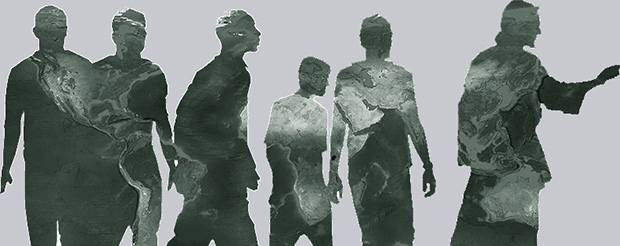Ecumenism of
Discipleship
.
by James M.
Kushiner
"And the disciples were called Christians first in
Antioch" (Acts 11:26). Christian is the
most common term we use today, but in the
apostolic church, the name didn't initially stick.
It did not originate with Jesus and was not chosen
by his disciples. It was the label the Antiochenes
put on the members of a new Jewish sect who
followed the teachings of the latest messiah
(Hebrew for anointed one, Greek, christos).
They could just as well have called them
"messianics."
A few years later, Agrippa asked Paul if he
intended to persuade him "to be a Christian" (Acts
26:26). Paul said yes, but did not repeat the
label. Peter wrote, "If anyone suffers as a
Christian, let him not be ashamed, but let him
glorify God in that name." The name "Christian"
would have been spoken as an accusation; Peter
said to own it with honor. Christian was
useful over many centuries, but it also has been
qualified by adjectives reflecting division:
Nestorian, Chalcedonian, Roman Catholic, Orthodox,
Byzantine, Protestant, Anabaptist, Evangelical,
and so on.
Nowadays, even those labels are contended. A
recent book, Still Evangelical? Insiders
Reconsider Political, Social, and Theological
Meaning, asks, according to InterVarsity
Press, "In the Age of Trump, Can We Still Be
Evangelical?" IVP claims, "Evangelicalism in
America has cracked, split on the shoals of the
2016 presidential election and its aftermath,
leaving many wondering if they want to be in or
out of the evangelical tribe." A schism over an
election? Perhaps some put too much stock in
politics. Or perhaps a copywriter is overstating
the case. Regardless, tensions over political,
social, and moral issues exist within other
churches, too, including Catholic, Evangelical,
Reformed, Anglican, and Orthodox ones. People tend
to wonder, even if they don't ask, "Is he a
liberal Catholic (or Evangelical, or Reformed,
etc.) or a traditional one?"
| Discipleship
is the ecumenism needed today.
Christians – Catholic, Protestant,
Orthodox, or other –
who are serious disciples
recognize each other when they meet. |
Perhaps these labels have more currency today
because of our fractious culture of identity
politics. It may be timely to recall that the
first Christians knew and identified themselves
first as disciples, mathetes, that is,
"learners," students following the teachings of
Jesus. They had accepted Jesus' invitation: "Take
my yoke upon you, and learn (mathete) from
me." Jesus charged them to "make disciples (matheteusate)
of all nations." The apostles did, and so the Book
of Acts is filled with references to disciples.
The word disciple puts the priority on our
posture as humble students of Christ rather than
on asserting various interpretations of theology.
A disciple is someone who follows closely someone
else's teachings. Disciples of Karl Marx, Sigmund
Freud, Peter Drucker, or Saul Alinsky are expected
to adhere closely to their mentor's teaching in,
respectively, social theory, psychology, business
management, or political activism.
The teachings of Jesus, however, are
all-encompassing. They are not a set of ideas
about a single topic but prescriptions for a whole
way of life that shapes the souls of those called
to be saints, the word Paul routinely uses
for Christians. Christ's teachings speak to the
heart of man. Following his Sermon on the Mount
will move us closer to him, whom we are to
imitate.
Unfortunately, there is division over the
teachings of the faith. Many claiming the label
"Christian" consider those things to be the
"teachings of Christ" that reflect various
agendas. Such selective teachings change with the
times: muscular Christianity, Social Gospel
Christianity, social justice Christianity,
environmental Christianity. The name Christian
has been watered down to an adjective for various
groups: Christian democrats, Christian socialists,
Christian feminists, Christian humanists, even
Christian atheists.
If discipleship is considered at all, it is
assumed that it means following an interpretation
of Jesus' teaching or his "example" on a favored
concern. Jesus did not turn away the outsider, so,
it is claimed, he would accept transgender persons
or same-sex couples as members of his Church in
good standing – perhaps even as leaders. But such
an editing of Jesus ignores the full scope of his
teaching, including his warnings in Revelation
about immorality in its various forms. It also
veers off the clear path laid out for us in the
Church's moral tradition, which is built on the
testimony of generations of faithful disciples.
Discipleship is the ecumenism needed today.
Christians – Catholic, Protestant, Orthodox, or
other – who are serious disciples recognize each
other when they meet. They recognize each other as
desiring to keep Christ's commandments and eager
to realize his promise: "If you keep my
commandments, you will abide in my love. . . .
These things I have spoken to you, that my joy may
be in you, and that your joy may be full" (John
15:11). Our generation, like all those before,
desperately needs the gospel. And to make
disciples, disciples are needed.
James
M. Kushiner is the Executive Editor of Touchstone: A Journal of Mere
Christianity.
This
article
was originally published in Touchstone: A Journal of Mere
Christianity, August 2018.
Touchstone is a monthly
ecumenical journal which
endeavors to promote doctrinal,
moral, and devotional orthodoxy
among Roman Catholics,
Protestants, and Orthodox. Copyright
© 2018 the Fellowship of St.
James. Used with permission.
Top illustration of
disciples from the nations following Jesus
Christ (c) by Rachel Chung
|

